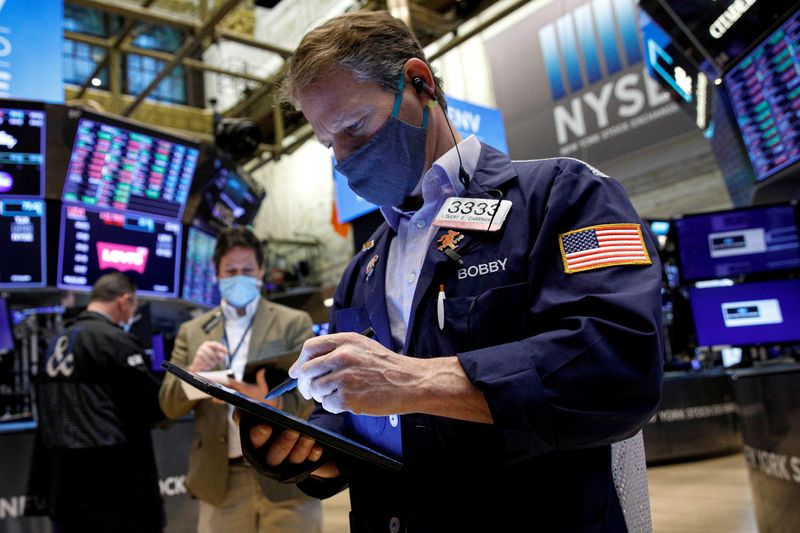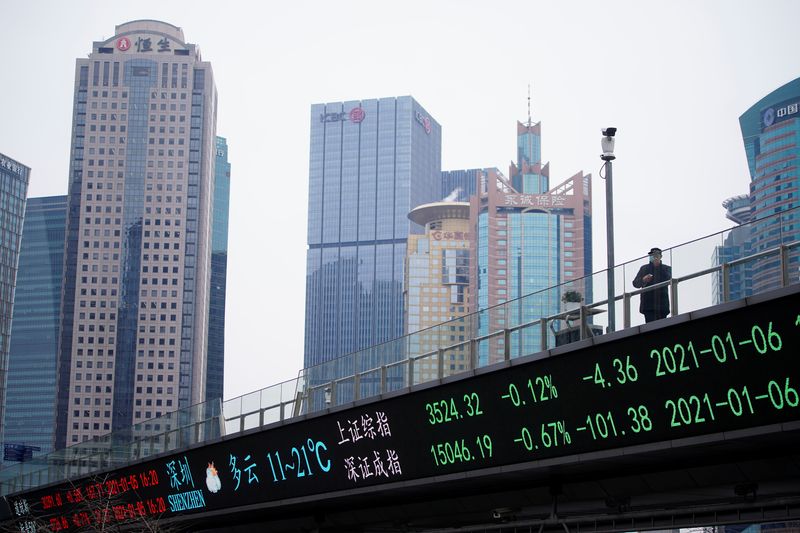By Dhara Ranasinghe and Koh Gui Qing
NEW YORK/LONDON (Reuters) - World stocks slumped on Monday as the growing risk of more aggressive U.S. and European interest rate hikes inflicted more pain on bond markets and pushed the dollar to new 20-year highs, as recession fears mount.
Two-year U.S. yields surged to a high of around 3.49%, the highest since late 2007 and far above the 10-year at 3.11%. Yields also jumped across Europe. [GVD/EUR]
Federal Reserve Chair Jerome Powell said at the Jackson Hole symposium on Friday the Fed would raise rates as high as needed to restrict growth, and keep them there "for some time" to bring down inflation running well above its 2% target.
European Central Bank board member Isabel Schnabel added to market unease. She warned on Saturday that central banks risk losing public trust and must act forcefully to curb inflation, even if that drags their economies into a recession.
Investors waking up to the reality that rates would remain high even as recession risk grows sold off risky assets.
The S&P 500 index fell 0.66% to its lowest in a month after a day of choppy trade. The Dow Jones Industrial Average lost 0.6%, and the Nasdaq Composite dropped 1%.
European stocks fell 0.8% to their lowest in over five weeks, and Japan's blue-chip Nikkei slid 2.7%.
London markets were closed for a holiday, while MSCI's world equity index fell 1% to a one-month low.
"The message from Jackson Hole was loud and clear and not what markets were expecting," said Nordea chief analyst Jan von Gerich.
"Central banks need convincing evidence that inflation is coming down. That is bad news for the economy and risk appetite and raises the risk of a deeper recession if we get more rapid rate hikes."
Investors ramped up U.S. and euro zone rate hike bets, with markets pricing in a greater chance of 75 basis point hikes from the Fed and ECB in September.
Fed funds futures priced in as high as a 73% chance the Fed will hike by 75 basis points, and rates peaking at 3.75% to 4.0%.
"Markets are focusing on discussing the message of 'coordinated tightening' from Jackson Hole as ECB and Fed appear to have re-committed to creating price stability: yields are shooting higher and risk assets are quite a bit lower since last week," said Lars Sparreso Lykke Merklin, senior analyst at Danske Bank.
Much might depend on what U.S. August payrolls figures show this Friday. Analysts are looking for a moderate rise of 285,000 following July's blockbuster 528,000 gain.
HUNKER DOWN
As investors hunkered down for front-loaded rate hikes, key gauges of equity market volatility shot up.
The CBOE Volatility index, widely dubbed Wall Street's fear index, rose to its highest since mid-July. The euro STOXX volatility index, the European equivalent, jumped to its highest level in six weeks.
"Chair Powell and the Fed make it crystal clear that their job fighting inflation remains unfinished," researchers at Morgan Stanley (NYSE:MS) said in a note to clients. "The path for stocks from here will be determined by earnings, where we still see material downside."
The aggressive chorus from central banks lifted short-term yields globally, while further inverting the Treasury curve as investors priced in an eventual economic downturn.
This all benefited the safe-haven dollar, which briefly shot to a fresh two-decade peak at 109.48 against a basket of major currencies.
The dollar hit a five-week high on the yen and was last up 0.8% at 138.72, with bulls looking to re-test its July top of 139.38.
Sterling sank to a 2-1/2-year low around $1.1649 as Goldman Sachs (NYSE:GS) warned Britain was heading for recession. The euro dropped to as low as $0.99145, not far from last week's two-decade trough of $0.99005, but was last up 0.3% at $0.9997
The Dutch September gas delivery contract dropped as much as 11% as Germany's economy minister said he expected prices to fall soon as Germany is making progress on its storage targets, with facilities nearly 83% full and set to hit its 85% Oct. 1 goal in early September.
Supply fears pushed natural gas futures in Europe 38% higher last week, adding further fuel to the inflation bonfire as a three-day halt to Russian natural gas supplies through its main pipeline to Europe will start on Wednesday.
German benchmark power prices, meanwhile, breached 1,000 euros per megawatt hour for the first time on Monday.
"I struggle to understand the sense of sharp (ECB) interest rate hikes. The big problem is energy supply, and right now it doesn't look we can get out any time soon," said Carlo Franchini, head of institutional clients at Banca Ifigest in Milan.
"Such a sharp rise in such a complicated economic picture will put companies and households in a very difficult situation. Trading volumes are really thin. I think it would be worth sell into any rally even though the word rally doesn't seem appropriate."
The rise of the dollar and yields has depressed gold, which was last flat at $1,737.45 an ounce.
Oil prices swung higher on speculation OPEC+ could cut output at a Sept. 5 meeting. U.S. crude recently rose 4% to $96.82 per barrel and Brent was at $104.77, up 3.7% on the day.

GRAPHIC - Dollar index at 20-year highs, yields soar
https://fingfx.thomsonreuters.com/gfx/mkt/lgpdwyrwmvo/dollar.PNG
